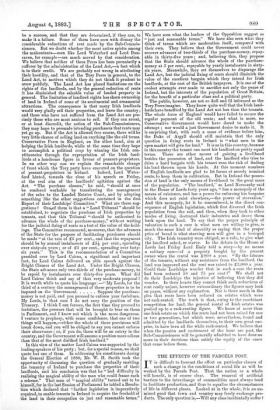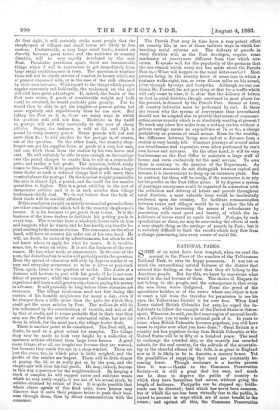THE EFFECTS OF THE PARCELS POST.
IT is difficult to forecast the effect on particular classes of such a change in the conditions of social life as will be worked by the Parcels Post. That the nation as a whole
will benefit, is of course clear. The removal of artificial barriers to the interchange of commodities must always tend to facilitate production, and thus to equalise the circumstances of life in different places. Looked at in the whole, it is an un- mixed good that town and country may freely exchange pro- ducts. The only question is,—Will any class incidentally suffer ? At first sight, it will certainly strike most people that the shopkeepers of villages and small towns are likely to lose custom. Undoubtedly, a very large retail trade, carried on directly between great towns and the residents in country districts, will be very rapidly developed by the now Post. Perishable provisions apart, there are innumerable things which it will be convenient to get immediately from large retail establishments in town. The question is whether these will not be chiefly articles of comfort or luxury which are at present dispensed with, or in the ease of the rich obtained by their own servants. With regard to the things which people require constantly and habitually, the tradesman on the spot will still have great advantages. If, indeed, the limits of the Post were wider, if goods of considerable weight and bulk could be obtained, he would probably gain greatly. For he would then be able to get his supplies at present prices, but more regularly and expeditiously than he can now. But taking the Post as it is, there are many ways in which his position will still aid him. Moderate as the tariff is, postage will add very materially to the cost of cheap articles. Sugar, for instance, is sold at 3d. and 34d. a pound by every country grocer. Seven pounds will not cost more than 2s. ; to add another ls. for postage is, of course, out of the question. On the other hand, the country shop- keeper can get his supplies down as goods at a very low rate, and can fetch them from the station by his own horse and cart. He will certainly be able to save enough on the carriage over the postal charges to enable him to sell at a reasonable price, and realise a fair profit. The question, indeed, realiy comes to this,—Will it be possible to obtain goods from a large town dealer at such a reduced charge that it will more than counterbalance the postage ? On the heaviest weight permissible the rate is almost lid. a pound, and the tariff for the smaller quantities is higher. This is a great addition to the cost of inexpensive articles, and it is in such articles that village tradesmen chiefly deal. We do not believe that the bulk of their trade will be sensibly affected.
If this conclusion is right on strictly economical grounds, there are other considerations which tell in the country shopkeeper's favour. It is his business to get goods from towns. It is the business of the town dealers to facilitate his getting goods in every way. The traveller from a wholesale house calls on him and suggests what he wants, and he has hardly any trouble be- yond sending to the nearest station. The consumer, on the other hand, will have to concoct his order out of his own head. He will, no doubt, be assisted by advertisements, but often he will not know where to apply for what he wants. It is trouble- some, too, to write an order. It is not the business of the con- sumer. He has other work, or amusements. In the case of the poor, the disinclination to write will probably settle the question. Even the spread of education will only by degrees render it an easy and every-day occurrence to write a letter or post-card. Then, again, there is the question of credit. The dealer at a distance will hesitate to part with his goods, if he is not con- fident of payment ; while the consumer of limited means and experience will have a still greater objection to paying his money in advance. It will probably be long before these obstacles are overcome. The village tradesman need not fear losing the custom of his humble neighbours for many a day, even if he charges them a trifle more than the price for which they could get the same articles by Post. The well-to-4o will be less influenced by the consideration of trouble, and not at all by that of credit, and it seems probable that in their case they may use the Post for articles of substantial value, but not for those in which, for the most part, the village trader deals.
There is another point to be considered. The Post will, no doubt, be used to a great extent for samples. The village shop may be made to look very bright by a collection of specimen articles obtained from large town houses. A good many things, after all, are bought not because they are wanted, but because they catch the eye in a shop-window. These are just the cases, too, in which price is little weighed, and the profits of the retailer are largest. There will be little demur at paying the 3d. or so really put on by the post, and the shopkeeper will clear his full profit. He may, indeed, become in this way a purveyor for the neighbourhood. By keeping a stock of samples, he will suggest tastes and cultivate wants which he may easily supply, if not out of his actual stock, by articles obtained by return of Post. It is quite possible that where clever agents of this kind exist, town houses may discover that it suits their purpose better to push their busi- ness through them, than by direct communication with the consumer.
The Parcels Post may in .time have a very potent effect on country life, in one of those indirect ways in which far- reaching social reforms act. The delivery of parcels in rural districts will, as the Post developes, require some machinery of conveyance different from that which now exists. It speaks well for the popularity of the postman that the one remark which every one has made about the Parcels Post is,—What will happen to the rural letter-carrier? Most persons living in the country know of some case in which a 'postman walks eight, ten, or even fifteen miles on his round, often through by-ways and footpaths. Although no one can blame Mr. Fawcett for not providing at first for a traffic which will only come in time, it is clear that the delivery of letters on foot in rural districts, though continued in most places for the present, is doomed by the Parcels Post. Sooner or later, all country deliveries must be performed by cart. Is there any reason why the system of conveyance thus necessitated should not be adapted also to provide that means of communi- cation across country which is so absolutely wanting at present To reach any place five miles from a railway station without a private carriage means an expenditure of 7s. or 8s., a charge prohibitory on persons of small means. Even for the wealthy, the difference between living near and at a distance from a station is very keenly felt. Constant journeys of several miles are troublesome and expensive, even when performed by one's own horses and servants. On the other hand, it will be very burdensome on the Post Office to maintain a large staff of
horses and carts exclusively for the mail service. To own them is contrary to the practice of the Department. As Government accounts do not distinguish between capital and income, it is inconvenient to keep up an extensive plant. But to contract for them will be costly, if the contractor is to rely for his profits on the Post Office alone. If by degrees a system of passenger conveyance could be organised in connection with the collection and delivery of letters and parcels throughout rural districts, a most valuable boon would be incidentally conferred upon the country. To facilitate communication between towns and villages would be to quinken the life of the latter, while increasing the means of refreshment by association with rural quiet and beauty, of which the in- habitants of towns stand so much in need. Perhaps, by such speculations as these, we may be over-rating the effects of such a very simple thing as the carriage of parcels by Post ; but it is certainly difficult to limit the results which may flow from a change penetrating into every corner of social life.



































 Previous page
Previous page